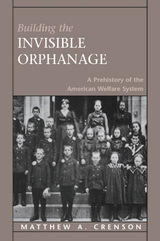
In 1996, America abolished its long-standing welfare system in favor of a new and largely untried public assistance program. Welfare as we knew it arose in turn from a previous generation's rejection of an even earlier system of aid. That generation introduced welfare in order to eliminate orphanages.
This book examines the connection between the decline of the orphanage and the rise of welfare. Matthew Crenson argues that the prehistory of the welfare system was played out not on the stage of national politics or class conflict but in the micropolitics of institutional management. New arrangements for child welfare policy emerged gradually as superintendents, visiting agents, and charity officials responded to the difficulties that they encountered in running orphanages or creating systems that served as alternatives to institutional care.
Crenson also follows the decades-long debate about the relative merits of family care or institutional care for dependent children. Leaving poor children at home with their mothers emerged as the most generally acceptable alternative to the orphanage, along with an ambitious new conception of social reform. Instead of sheltering vulnerable children in institutions designed to transform them into virtuous citizens, the reformers of the Progressive era tried to integrate poor children into the larger society, while protecting them from its perils.

What makes an urban neighborhood tick? Why do some of a city’s poorest neighborhoods have cleaner streets and less vandalism than many of its more affluent areas? The public services that make certain neighborhoods stand out are often provided by the local residents themselves—but what makes them take action?
The setting for Matthew Crenson’s book is Baltimore. In this surprising, powerful work, he finds that such neighborhood action does not arise from a strong sense of neighborliness or community feeling. Instead, it is precisely when neighbors dislike one another that some features of informal self-organization emerge. Residents’ efforts to maintain public order, health, and safety frequently spring from social chaos and discord rather than from homogeneity. In fact, Crenson discovers that in many cases community polities arise not from the cohesiveness of close-knit “urban villages” but from the social diversity, inequality, and conflict that are associated with urbanism itself.
In an era when the inability of government institutions to solve the difficulties of city living is starkly apparent, understanding unofficial neighborhood government is critically important, and it can also clarify the foundations of political order itself. Crenson’s achievement is to redefine neighborhood problem-solving as the true “grass roots” urban politics, and in doing so he reveals why Baltimore is one of the few big cities that really work in America today.
READERS
Browse our collection.
PUBLISHERS
See BiblioVault's publisher services.
STUDENT SERVICES
Files for college accessibility offices.
UChicago Accessibility Resources
home | accessibility | search | about | contact us
BiblioVault ® 2001 - 2024
The University of Chicago Press









